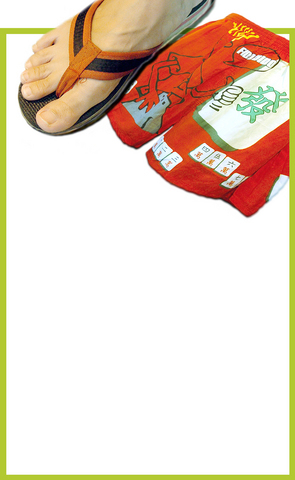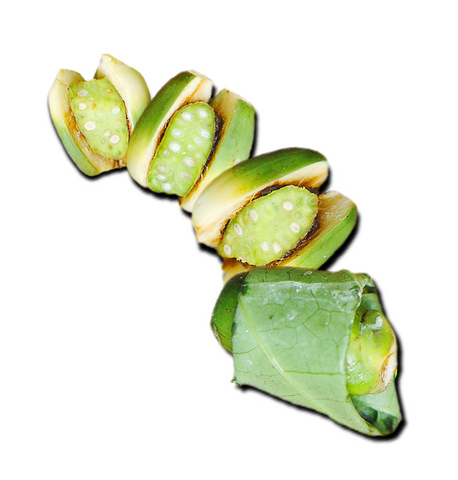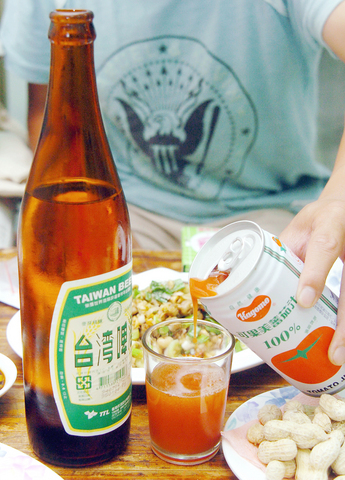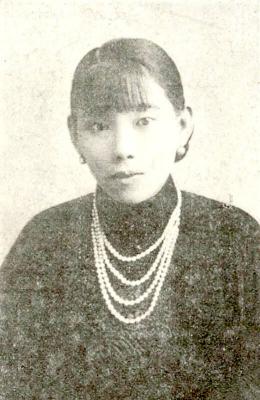A woman walks into a 7-Eleven wearing plastic slippers, jeans under a short skirt, an "Abibas" shirt and her motorcycle helmet. She purchases a bottle of rice wine, several cans of Vitali, and a pack of Long Life cigarettes, gets on the back of a scooter already occupied by three family members and rides away.
Though this scenario is an imagined one, it's no stretch of the imagination. It is a stereotypical look at the habits of a few Taiwanese people's habits and behavior. This was sometimes encapsulated by the term taike (
But while the slight hasn't completely lost its sting, it has been soothed by the surging popularity of Taiwanese culture. "Taike" has entered the lexicon of cool.

PHOTOS: CHANG CHIA-MING, TAIPEI TIMES
In their current issue, the editors of Eslite Reader (
It claims taike as a term is not anti-Taiwanese, but instead can be embraced as an integral part of local culture and another aspect of bentuhua (
"Some people have told us that if we talk about it, we're still making fun of it," said Sophie Chiang (

It wasn't always thus. When the KMT supporters first arrived in the country they were often ostracized by locals who felt oppressed by the government that had taken charge of the island. The KMT supporters, many of them soldiers, were seen by Taiwanese as tang shan zi (
To the new arrivals, locals became taike, literally "Taiwanese guests." This was the sociopolitical pressure cooker that would simmer and occasionally come to boil over the next decades, alleviated by the end of martial law nearly 20 years ago and democratization.
To what degree time has tempered those ill feelings depends on who you ask, but it has certainly altered the semantics of the situation. For today's generation of young people in particular taike is more likely to be used playfully, rather than used as an insult.

It has even been co-opted by some who embrace the stereotypes. Wu Peng-feng (
"It depends on who's talking and how they say it," he said. "If it's a young person, they probably don't mean it as an insult. But if it's an older person, it could be impolite. It depends on their tone."
Like others interviewed for this article, Wu shied away from offering a description of the term, saying instead that one simply knows it when one sees it.
Examples that were offered by others included: The cup wedged between the seats of a cab for the driver to spit betel nut; watermelon dipped in soy sauce and wasabi; the ubiquitous sausage-seller; hometown rock hero Wu Bai's (
Chiang said their decision to write about "new taike", as they call it, was based in part on the many Web sites that discuss the stereotypes.
"Some [of the Web sites] say it's discriminatory and other say it's still a little bit insulting," she said. "But at the same time there are celebrities who imitate taike." Rather than making fun, she said, they're emulating attributes they find cool.
Advertising, too, has targeted the stereotypes to sell everything from energy drinks to banking services.
"Taike is being released from its stereotypes and becoming a lifestyle term," Chiang said. "To embrace it, you maybe accept a more liberal lifestyle or you are bolder or braver. ... It's about the power of naming and identity," she said, and the fact that we control what words mean.
Still, there are places where plastic slippers aren't seen as a fashion statement. Signs outside nightclubs often proscribe chewing betel nut or blowing whistles and warn that anyone wearing slippers will be refused entry.
Chiang prefers to see the current debate in a broader context. Despite Taiwan's 400 years of history, she said, colonization and political upheaval have made for interesting times.
"Everything has happened here very quickly," she said. "The essence of being Taiwanese is change. Taike, too, is changing in context."
△ Look for the Taike Rock and Roll Concert (台客搖滾演唱會) to take place on Aug. 19 and Aug. 20 at the Taipei International Convention Center, with headliners Wu Bai and China Blue, MC Hotdog, Zhang Zhen-yue (
△ For more information on tickets and what it means to be taike, visit http://www.bcc.com.tw/all_net/news/tsong/tsong.htm.

Many people noticed the flood of pro-China propaganda across a number of venues in recent weeks that looks like a coordinated assault on US Taiwan policy. It does look like an effort intended to influence the US before the meeting between US President Donald Trump and Chinese dictator Xi Jinping (習近平) over the weekend. Jennifer Kavanagh’s piece in the New York Times in September appears to be the opening strike of the current campaign. She followed up last week in the Lowy Interpreter, blaming the US for causing the PRC to escalate in the Philippines and Taiwan, saying that as

US President Donald Trump may have hoped for an impromptu talk with his old friend Kim Jong-un during a recent trip to Asia, but analysts say the increasingly emboldened North Korean despot had few good reasons to join the photo-op. Trump sent repeated overtures to Kim during his barnstorming tour of Asia, saying he was “100 percent” open to a meeting and even bucking decades of US policy by conceding that North Korea was “sort of a nuclear power.” But Pyongyang kept mum on the invitation, instead firing off missiles and sending its foreign minister to Russia and Belarus, with whom it

The Chinese Communist Party (CCP) has a dystopian, radical and dangerous conception of itself. Few are aware of this very fundamental difference between how they view power and how the rest of the world does. Even those of us who have lived in China sometimes fall back into the trap of viewing it through the lens of the power relationships common throughout the rest of the world, instead of understanding the CCP as it conceives of itself. Broadly speaking, the concepts of the people, race, culture, civilization, nation, government and religion are separate, though often overlapping and intertwined. A government

Nov. 3 to Nov. 9 In 1925, 18-year-old Huang Chin-chuan (黃金川) penned the following words: “When will the day of women’s equal rights arrive, so that my talents won’t drift away in the eastern stream?” These were the closing lines to her poem “Female Student” (女學生), which expressed her unwillingness to be confined to traditional female roles and her desire to study and explore the world. Born to a wealthy family on Nov. 5, 1907, Huang was able to study in Japan — a rare privilege for women in her time — and even made a name for herself in the